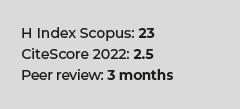Extended-spectrum beta-lactamase (ESBL)-producing enterobacteriaceae in fecal samples at the national institute of child health, Peru
DOI:
https://doi.org/10.17843/rpmesp.2015.321.1571Keywords:
beta-Lactamasa I, Feces, EnterobacteriaAbstract
Objectives. To describe the frequency of extended-spectrum beta-lactamase (ESBL)-producing enterobacteriaceae in fecal samples at the National Institute of Child Health, Lima, Peru. Materials and methods. Stool samples received between July 2012 and March 2013 with colonies suspected to be ESBL-producing enterobacteriaceae that developed in Karmali agar were analyzed. Conventional methods were performed for biochemical identification and the confirmation of the ESBL phenotype. Genotypic analysis to detect the beta-lactamase gene CTX-M family was performed by PCR. Results. Of the 235 fecal samples analyzed, 64.2% of ESBL-producing enterobacteria was isolated being 86.1% Escherichia coli, 7.9% Klebsiella pneumoniae, 2.6% Salmonella sp, 2.0% Enterobacter cloacae, and 1.3% Proteus mirabilis. 89.1% of the ESBL-producing enterobacteria presented the CTX-M gene. We found high resistance to nalidixic acid 84.8%, 74.2% ciprofloxacin and trimethoprim-sulfamethoxazole 81.5%.The resistance to amikacin was 1.3% and all isolates were susceptible to imipenem and meropenem. Conclusions. A high frequency of ESBL-producing enterobacteria was found in fecal samples of outpatients seen in the outpatient and emergency departments of the National Institute of Child Health of Peru.Downloads
Download data is not yet available.
Downloads
Published
2015-04-01
Issue
Section
Research Articles
How to Cite
1.
Colquechagua Aliaga F, Sevilla Andrade C, Gonzales Escalante E. Extended-spectrum beta-lactamase (ESBL)-producing enterobacteriaceae in fecal samples at the national institute of child health, Peru. Rev Peru Med Exp Salud Publica [Internet]. 2015 Apr. 1 [cited 2024 Apr. 19];32(1):26-32. Available from: https://rpmesp.ins.gob.pe/index.php/rpmesp/article/view/1571



























